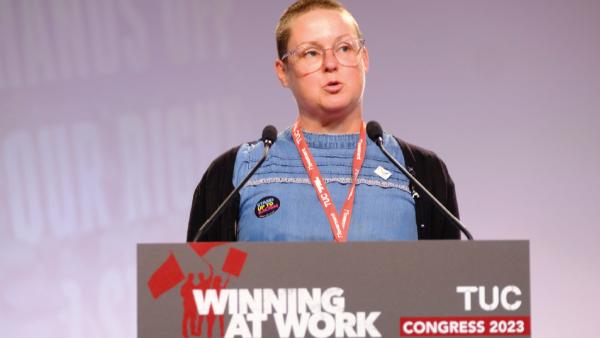Jill Taylor – outgoing chair of the CSP’s National Group of Regional Stewards (NGRS) – reflects on her career as a CSP workplace rep
In 2000 I began work in the NHS as a junior physio. At an early staff meeting our CSP steward asked for extra volunteers.
Having grown up in a strong trade union household – my dad was a senior rep for Unite, and we’d lived through the miners’ strike and poll tax riots in 1990 – I was excited that an opportunity to get involved came up so early in my career.
I was instantly hooked.
As a new steward with a thirst for knowledge – about my rights as an NHS worker and promoting the voice of physiotherapy and AHPs in a system dominated by medics – I took every opportunity the CSP gave me.
When attending my regional rep training, I realised that the north had very little voice or influence centrally – and I signed up as the Northeast rep to NGRS. I have been active ever since: later chairing this wonderful group of CSP activists from all four countries.
I have also been chair of the CSP employment committee where employment issues affecting all CSP members are addressed. All of these roles have been valuable to me as a clinician, learning transferable skills which have been in key in career progression.
Adapting to change

So much has changed, in the NHS, in the physiotherapy profession, and in the CSP during this time.
After 14 years of a Conservative government, the NHS is in dire need of support. But throughout, the CSP has fought tirelessly for better pay terms and conditions. In 2011 we stood up and took action for our pensions. Most recently I took part in our strike action in England and Northern Ireland for better pay.
We have also worked as part of the bigger TUC movement – with reps working through joint-union staffsides locally and nationally, fighting for our voice to be heard.
Physiotherapy as a profession has also adapted, coming to demonstrate how we are an essential part of the solution.
Workplace support
Along with hundreds of CSP stewards, safety reps, and equality reps, I have supported members in times of difficulty – whether that is sickness management or moves to seven-day services.
I could not have done any of this without the formidable training the CSP have given me – covering negotiating skills, job evaluation, supporting our neurodiverse workforce, and promoting equality, diversity and belonging at every opportunity.
CSP reps are essential in all workplaces.
Facing the future

I step down from my steward roles with a new government in place and at a time of hope for working people across the UK.
I leave NGRS in the very capable safe hands of Mike Mander, a strong trade union activist.
I’m also proud to be part of the new CSP Council from October this year.
One piece of advice: if you’re given an opportunity to become a rep, grab it with both hands and be part of the solution.
You can find out more about being a rep, from our organising and campaigning on workplace issues page on the website.
NGRS is tasked with informing the CSP of issues in the workplaces, and emerging trends concerning members. In parallel, our National Group of Regional Safety Reps (NGRSR) reviews threats to our members’ health and well-being.
So, make sure your workplace reps know what’s affecting you and your colleagues – it’s one of the keyways you can shape the CSP’s collective response.
Find Out More
Number of subscribers: 1

